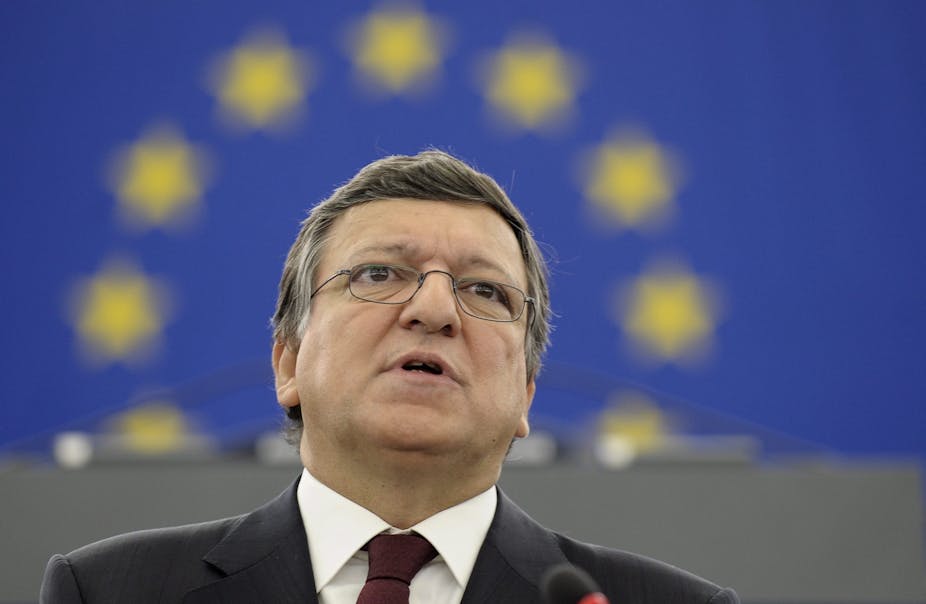Momentum is building behind the global campaign to impose a tax on transactions in financial markets, with European Commission President Jose Manuel Barroso announcing plans to introduce the measure as way of overcoming the Eurozone’s economic woes.
In his annual “state of the union” address in Stasbourg on Wednesday, Barroso said the tax could raise up to 55 billion euros ($76.6 billion). “It is time for the financial sector to make a contribution back to society,” he said.
His proposal comes after German Chancellor Angela Merkel and French President Nicolas Sarkozy announced their support for the measure after a meeting in August. Leaders in the United States, United Kingdom and Australia have rejected proposals to introduce the tax in their own countries.
At a time when there is a financial malaise on both sides of the Atlantic, it may seem strange to be talking about a new tax.
But a financial transaction tax (FTT) is a long-term policy which would ease several aspects of the crises.
High budget deficits and debts can be addressed by increasing revenue, and a tax on financial transactions is likely to cause less opposition than any other.
A taxing challenge
So what is a FTT, and what are the potential benefits and costs?
Economist John Maynard Keynes suggested in 1936 that a substantial transfer tax on securities transactions could reduce speculation in financial markets.
Nobel laureate economist James Tobin proposed a currency transaction tax (CTT) in 1972, and reiterated that suggestion in the mid-1990s.
Since then, the idea has gradually gained support among scholars as well as development and environmental NGOs. Recently political support for the idea has grown strongly.
It was brought up during a Special Session of the United Nations General Assembly on Social Development, held in Geneva in June 2000, when Canada officially proposed that a study into the FTT be authorised.
There was opposition from the United States and some other countries, so a compromise was negotiated, calling for a study of “innovative sources of funding for development”.
The UN University’s World Institute for Development Economic Research was commissioned to conduct the study and eminent econometrician Professor Sir Anthony Barnes Atkinson agreed to lead the project. The papers were published as “New Sources of Development Finance” in 2005.
Around the same time, Rodney Schmidt of the Canadian North-South Institute studied whether a tax on currency transactions would cause increased exchange rate volatility as a result of the expected fall in trading volume.
Schmidt found that “a currency transaction tax of 0.5 basis points (0.005%) in the major currency markets would reduce transaction volume by 14% … A 0.5 basis point CTT would raise at least $US33 billion every year, probably more.”
A CTT could be imposed almost universally on transactions, as long as it had the cooperation of the four or five monetary authorities of the countries with the principal reserve currencies – especially the US dollar, the pound and the euro.
The small direct costs would be concentrated in financial sectors of the countries where most transactions occur – the wealthy countries.
Growing momentum
Political momentum for introduction of a FTT was nurtured through the formation in 2006 of the Leading Group on Innovative Finance for Development, of which about 55 countries are now members including Belgium, Chile, Finland, France, Germany, India, Italy, Japan, Mexico, Norway, United Kingdom, South Africa and Spain.
In mid-2009 the Leading Group appointed a committee of experts to report on a CTT. The committee reported in June 2010, and recommended introduction of a global CTT at the point of settlement.
The committee recommends collecting a tiny tax of 0.005% through a “Global Solidarity Levy” collected through the increasingly centralised foreign-exchange trading system’s settlement bank.
The committee recommended establishing a “Global Solidarity Fund”, with a representative governing body to allocate funds for global public goods, such as the achievement of the Millennium Development Goals and climate change mitigation and adaptation.
The global financial crisis has strengthened support for this proposal. The Bush and Obama administrations, and many European governments, were compelled to launch massive rescue strategies for financial institutions.
Citizens are therefore demanding ways of making financial institutions return the favour.
Nobel economics laureate Paul Krugman argues that such a tax “would be a trivial expense for people engaged in foreign trade or long term investment; but it would be a major disincentive for people trying to make a fast buck (or euro, or yen) by outguessing the markets over the course of a few days or weeks. What’s not to like?”
The centralisation of such transactions makes them relatively easy to monitor.
Political will
Governments have significantly different views about how to tax financial sectors: the US and UK want a levy on bank liabilities. But Merkel and Sarkozy are now publicly advocating that the G20 recommends that countries introduce a financial transaction tax.
The European Commission supports global introduction of the tax but if this is not agreed by the G20, legislation will be passed to introduce financial transaction taxes at the European level.
The IMF has previously argued for alternative levies on banks, but their most recent paper on the administrative feasibility of a FTT concludes that “in principle, an FTT is no more difficult and, in some respects easier, to administer than other taxes”.
It would be timely for the Australian Government to review its knee-jerk agreement with the US in opposing the proposal.
If Treasurer Wayne Swan would like to generate additional revenue in the least controversial way, he would do well to join Germany, France and the rest of the European Community – as well as many countries in the developing world – in supporting a global FTT.

